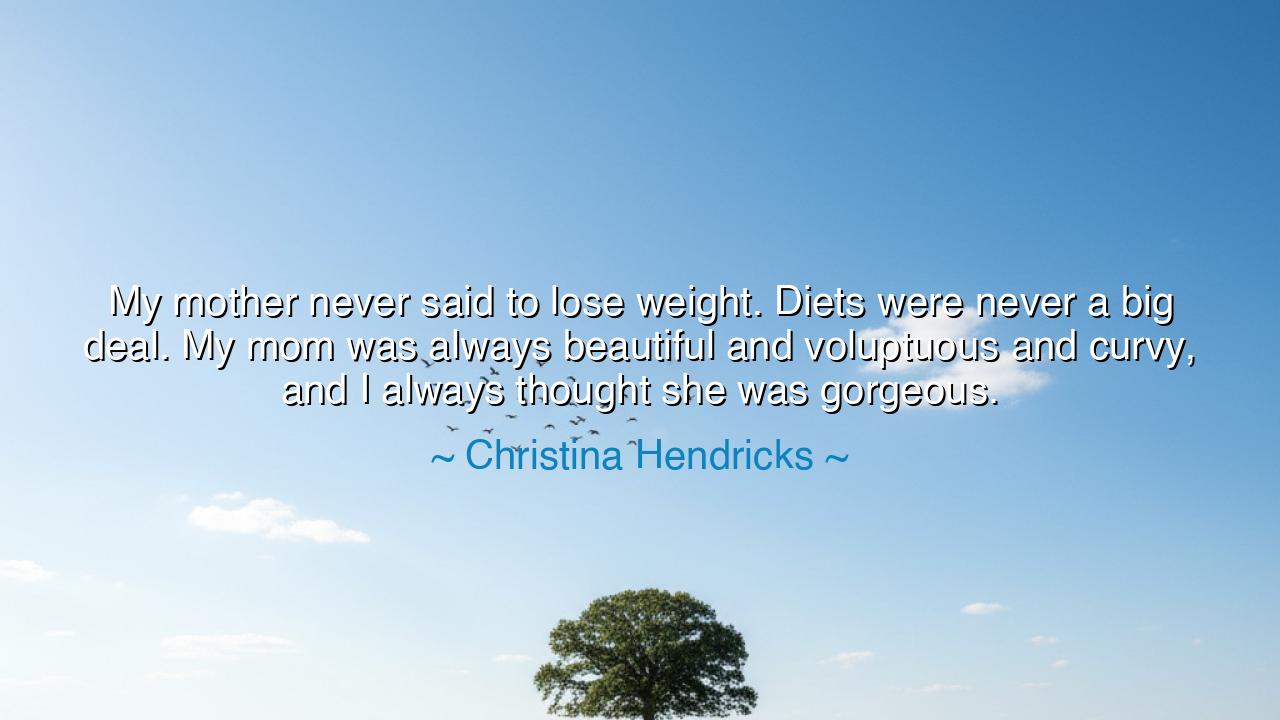
My mother never said to lose weight. Diets were never a big deal.
My mother never said to lose weight. Diets were never a big deal. My mom was always beautiful and voluptuous and curvy, and I always thought she was gorgeous.






In the tender and truthful words of Christina Hendricks, we hear a quiet anthem of self-acceptance and inherited grace: “My mother never said to lose weight. Diets were never a big deal. My mom was always beautiful and voluptuous and curvy, and I always thought she was gorgeous.” Within these words lies not only a daughter’s admiration, but a profound lesson about the power of example, the shaping of identity through love, and the enduring strength of women who honor their natural selves. It is a statement that defies the harsh noise of judgment and perfection, offering instead the ancient wisdom that true beauty is not sculpted by denial, but by dignity.
From the beginning of time, mothers have been the first mirrors in which daughters see themselves. Before the world’s voices can speak, the mother’s example teaches what it means to be beautiful, worthy, and whole. Hendricks’ mother, in her quiet confidence, gave her daughter a gift rarer than jewels — the gift of peace with her own reflection. By never speaking of diets, by never condemning her body, she taught through silence what countless words could not achieve: that self-worth is not earned through struggle against the body, but through harmony with it. This is the wisdom of acceptance, the kind that can shape generations.
In ancient days, the divine feminine was not confined to a single form. The goddesses of Egypt, Greece, and the East were voluptuous and strong, their forms symbols of fertility, love, and abundance. The goddess Aphrodite, who rose from the sea foam, was not celebrated for her thinness but for her radiance — a light that came from within. Likewise, Isis of Egypt and Lakshmi of India were portrayed with softness and roundness, emblems of life itself. The ancients understood what modern society has forgotten — that beauty is not a mold to fit into, but a reflection of one’s vitality and spirit. Hendricks’ mother, by her example, kept that ancient truth alive in a modern world obsessed with illusions.
When Hendricks says she “always thought her mother was gorgeous,” she speaks not of surface admiration but of reverence. It is the kind of beauty that is born from presence — the way a woman carries herself when she no longer apologizes for existing. This, too, is the heritage of wisdom passed from mother to child. For every time a mother speaks kindly of herself, she writes into her daughter’s heart the permission to love herself freely. Every time she stands tall without shame, she tells her child, You too are enough.
History is full of women who defied the dictates of beauty and left the world transformed. Eleanor Roosevelt was called plain, yet she became one of the most beloved and respected figures of her century. Maya Angelou, with her powerful presence and unapologetic selfhood, taught generations that “we delight in the beauty of the butterfly, but rarely admit the changes it has gone through to achieve that beauty.” Like Hendricks’ mother, these women became beacons — living proof that beauty deepens, not diminishes, when it is rooted in authenticity.
And so Hendricks’ quote is not simply about her mother — it is about a lineage of women who dare to live without apology. It reminds us that confidence is not taught through command, but through example. When a woman accepts her body, she heals not only herself but those who come after her. When she rejects shame, she breaks a chain that has bound countless others. This is the quiet revolution of love — one that begins not in protest, but in peace.
Let this then be the teaching for all who hear: Do not despise the body that carries you. Do not measure your worth by the illusions of others. Be as Hendricks’ mother — radiant, grounded, unashamed. See your reflection not as an enemy, but as a companion in your journey through time. Speak gently of yourself, for the world has enough harshness already. And if you are a parent, a mentor, or simply a soul who walks beside others — know that your acceptance of yourself may be the light that frees another from darkness.
For as Christina Hendricks reminds us through her mother’s wisdom, beauty is not a competition — it is an inheritance, one that is preserved through kindness, authenticity, and love. When we honor the bodies we live in, we honor the divine artistry that made them. And in doing so, we restore to the world the timeless truth that every curve, every line, every imperfection is part of the masterpiece that is life itself.






AAdministratorAdministrator
Welcome, honored guests. Please leave a comment, we will respond soon